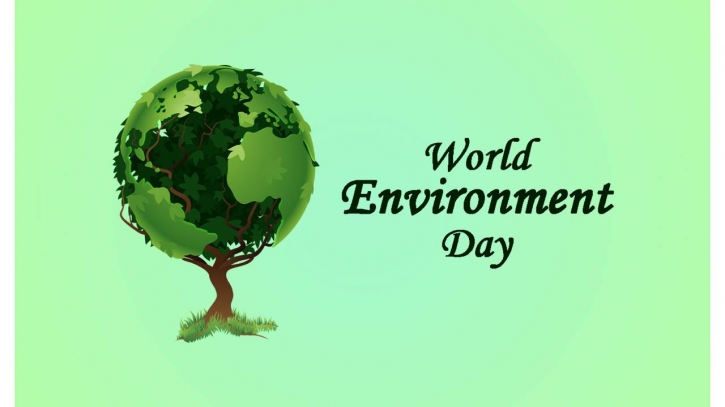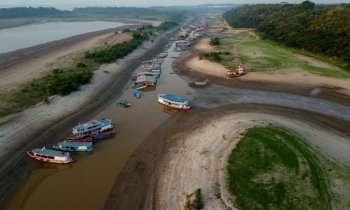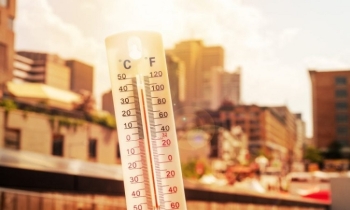World Environment Day: Need to focus responses on areas causing environmental degradation
The Economic Times || BusinessInsider

Photo: Business Insider Bangladesh
Deaths due to air pollution have sadly been far more than the deaths due to covid. This menace has spared no one, neither the old nor the young, not even those in the pre-natal stage. A research project by the Harvard school of public health reveals that 15% of global Covid-19 deaths were linked to manmade pollution, particularly particulate matter with a diameter of less than 2.5 micrometres.
The issue of clean air, therefore, must assume as much significance, if not more, as the basic necessities of ‘bread, clothing, housing' and the millions of aspirational material belongings for which we crave. Whatever policies or laws the government may legislate - and it has already done so with respect to vehicles, construction, industrial emissions, green cover in the country, agro waste management and so on - it is amply clear that unless civic society makes it a grassroots movement, success in this domain will continue to elude us.
Data in public domain reveals that life expectancy has actually declined by 6-12 years in various regions of the world, varying with the intensity of pollution. The death toll too has gone up by 30%, solely due to air pollution, due to which as many as seven million people die globally every year. Similarly, public health has deteriorated, particularly among the older generation and children. Children are particularly susceptible to air pollution as established by a research study done by Lung Care Foundation.
Ailments such as obesity, asthma, heart problems and other related diseases have also drastically gone up. As per the Global Burden of Disease Report 2019, over 61% of total deaths in India were due to Non-Communicable Diseases (NCDs) including the above and air pollution is established as a major risk factor for these.
It is high time that Environmental issues redraw our full attention. Needless to say, we have to first understand all the elements of ecological balance of our environment and then carve out the concern areas where awareness, as well as deterrence, needs to be established. This is an ongoing exercise that would enable us to check further deterioration of nature’s eco-system, which is the basis of our existence. The rise in temperatures, displacements of weather patterns, growing severity of natural calamities, intensifying pollution levels and unfavourable changes in bio-diversity that sustains us, all need our increasing attention.
The Intergovernmental Panel on Climate Change (IPCC), the world’s highest authority on climate science, in its latest report says that we now know how to prevent the worst impacts of climate change, just that we need to act urgently, effectively and equitably to protect our planet. In that report, scientists have warned the world that we have 12 years to limit the climate change catastrophe. Let us be clear about it that all these distortions have their roots in the path of economic development that human beings have adopted over the last century; life styles that have not proven to be eco-friendly due to wastage and unbalanced allocation of resources between the haves and the have-nots, which has caused economic, social and environmental stress.
The way issues of environmental displacements have emerged over time, we require enhanced global diplomatic efforts to bring all countries on the same page. There is also a need to create robust funding options by developed nations for facilitating the developing countries to switch to energy-efficient and sustainable options which they are unable to implement due to scarcity of resources. The countries which can make a difference are still not doing enough to catalyse this change towards energy efficiency and we are repeatedly missing our targets. Presidencies at international conferences, like the recent COP-26 held at Glasgow in 2021, need to negotiate effectively with member countries to coax high-emitting developed nations to release enough climate finance for developing nations, so that without halting their progress, they can be a part of protecting the planet.
It is evident that our passion for economic growth at all costs has compromised nature’s capacity to protect and sustain a robust environment. The breakneck speed at which we are extracting and consuming natural resources and energy is increasing pollution levels and releasing hydrocarbons much beyond the self-sustaining capacity of Mother Nature. Thus, it is becoming impossible to maintain a balance in our environment and ensure sustenance of earth’s eco-system. One of the glaring examples of the challenges to sustainability till the recent past has been the policy of commercial exploitation of forests and wild life. It is only in recent years that civic society and scientists have raised an alarm highlighting the calamity facing us and the speed at which it is hurling towards us.
Similarly, the indiscrete use of fossil fuel for servicing energy requirements has resulted in uncontrolled release of hydrocarbons in the atmosphere and global warming. The international framework required to align efforts to achieve Sustainable Development Goals (SDGs) and end the era of fossil fuels need to aim at non-proliferation, equitable phase-down and a fair transition away from fossil fuels, toward renewable energy.
Sluggish expansion of capacity and technology for non-conventional energy sources is another example of human failure in controlling environmental damage. The constant pressure for growth is compelling the corporate sector to be expedient and use half-baked technologies which are financially lucrative, providing partial solutions but actually end up accentuating environmental problems.
The threats, therefore, lie in the human zeal to constantly achieve higher economic growth, without considering its detrimental consequences. This zeal has led to uncontrolled industrial pollution, vehicular emission, defective urban architecture, inadequate solid waste management, shrinking green cover and many such undesirable outcomes.
Air pollution cannot be seen in isolation as ‘everything hangs together’. Non-living components of environment include things like soil, air, water; while the living components are plants and animals. It is the living components, who are essentially the producers, consumers, and decomposers which play the key role in environment stability and the prime consumers are humans who have an insatiable appetite to consume resulting in destabilising our eco-system.
The rising temperature of the earth is setting off a vicious cycle. The whole ecosystem is getting affected in terms of the loss of micro-organisms, and the earth is losing entire species causing gaps in the delicate balance of nature. Global warming is causing unpredictable weather, rising sea levels, attrition in water resources, melting glaciers and so on. This entails first a survey and data collection, real-time monitoring of pollution levels, and then finding the impact of the contemporary technologies in order to properly zero down on its very source. There is no doubt that only a cause and effect-based mitigation in a decentralised manner holds the key to sustainability. This year marks the 50th anniversary of the Stockholm conference, the first conference to talk about the health of our planet. It is high time the leaders deliver their climate-related promises, in the interest of people and the planet.
The action points to counter pollution mainly include greening the habitat, encouraging walking and cycling as well as the use of public transport, segregating waste at source and converting it to manure. Further actionable points at the cutting-edge include reducing and recycling plastic waste, encouraging use of natural biodegradable and earthen materials for making sustainable products. Sensitising children and the younger generation is most critical as this is a long term battle and coming generations must be aware and vigilant on environmental issues.
Last, but not the least, we must focus on asserting as well as supporting government initiatives to implement laws that support environmental health, adopting available technology to minimise carbon footprint, saving electricity, adopting solar options, electric vehicles and evolving innovative ways in collaboration with all stakeholders. Taking cognizance of the research study on ‘Air Pollution and Obesity, Asthma and Allergic Diseases’, the National Green Tribunal, in Sept. 2021, has directed all states to form State Action Plans for clean air, and has asked the Central Pollution Control Board to provide guidance and support for the same.
Lesser developed countries have incongruence and inconsistency in their developmental cycle. But one needs to take action in a balanced and graduated manner with a positive mindset. In order to unlearn and relearn these harsh facts that are glaring us in the face critical and uncomfortable decisions have to be taken for the sake of survival of the human race and mother earth. We need to take a fresh look at some data. What we thought would happen in 50 years, has actually happened in only 10 years as the temperature of the planet has increased by 1.5C. Now if we don’t put a check on it, then it will rise further, which is an alarming scenario. This is the harsh reality of our impending future which would have a severe and spiralling effect.
The need of the hour is to focus our responses on all areas causing environmental degradation based on R&D to restore bio-diversity imbalances. Basing our actions on half-baked knowledge for merely branding ourselves as ‘environmentally responsible’ is the biggest disservice we can do to our future generations. Nature will anyways restore its balance even at the cost of human lives and habitats. Someone has light heartedly remarked that all would be fine on Mother Earth if human beings migrated to another planet! This really is the truth and we need to mend our ways individually and collectively and show much greater respect to nature.





































